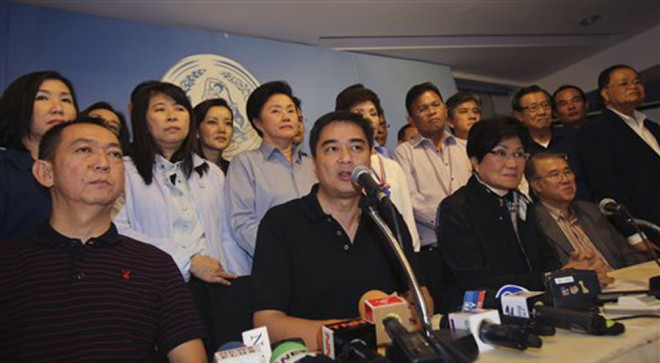
Democrat leader and former Prime Minister Abhisit Vejjajiva, center, speaks along with his party members during a press conference in Bangkok, Thailand, Sunday, Dec. 8, 2013. The main opposition party announced it was resigning from parliament to protest what it called “the illegitimacy” of the government. AP
BANGKOK, Thailand—Thailand’s main opposition party resigned from Parliament on Sunday to protest what it called “the illegitimacy” of a government with which it can no longer work. The move deepens the country’s latest political crisis one day before new street demonstrations that many fear could turn violent.
Democrat Party spokesman Chavanond Intarakomalyasut said his party could not work in the legislature anymore because the body is “no longer accepted by the people.”
The minority Democrats are closely aligned with anti-government protesters who have staged the country’s biggest rallies in years. The demonstrations began last month and are aimed at ousting Prime Minister Yingluck Shinawatra, whose democratically elected government came to power in a landslide vote in 2011 that observers said was free and fair.
The Democrats have not won an election since 1992, and some of their leaders appear to have given up on electoral politics because they cannot win. The protesters are demanding a non-elected people’s council lead the country instead.
Thailand has been plagued by political turmoil since Yingluck’s brother Thaksin Shinawatra, a former premier, was toppled in a 2006 military coup. In broad terms, the confrontation pits the Thai elite and the educated middle-class against Thaksin’s power base in the countryside, which benefited from populist policies designed to win over the rural poor.
At least five people have been killed and at least 289 injured since the latest unrest began. Several days of violence ended suddenly last week as both sides paused to celebrate the birthday of the nation’s revered king, who turned 86 Thursday. But protesters have vowed a final showdown Monday in Bangkok and will march en masse from a government complex they seized to Yingluck’s office.
Democrat leader and former premier Abhisit Vejjajiva told reporters the resignations were effective immediately.
He said Yingluck’s government has been “illegitimate” ever since her ruling party tried to ram through an amnesty bill that critics allege was mainly designed to bring back Thaksin from exile. Thaksin lives in Dubai to avoid a jail sentence for a corruption conviction he says was politically motivated.
“The solution to our current problems needs to start with the showing of responsibility,” Abhisit said. “The prime minister has never showed any responsibility or conscience.”
Abhisit also criticized Yingluck’s Pheu Thai party for trying to amend a clause in the constitution that would have transformed the Senate into a fully elected body. Currently about half its members are selected by a panel of judges and heads of independent state agencies. The Constitutional Court sharply scolded Yingluck’s party for the move.
The Democrats held 153 of the 480 seats in the lower house, according to the latest figures on their website.
In a speech Sunday, Yingluck said again that she was not trying to cling to power and would be “happy to resign” and dissolve Parliament if that could ease the crisis. But she said those things could only happen if new elections are organized within 60 days and all parties accept the outcome.
Protest leader Suthep Thaugsuban, who recently resigned from the Democrat party to lead the protests, has repeatedly rejected those initiatives and refused to negotiate.
Yingluck also reiterated an offer to set up a national forum to find a way out of the crisis. She said if there was still no resolution, a national referendum could be held, but she did not specify on what.
Any “government that comes to power without elections would significantly affect our image and confidence in the country,” Yingluck said, referring to Suthep’s demand for a specially appointed “People’s Council” to rule.
Whatever happens, Yingluck added, “it must be asked whether this is the wish of the majority of the people or not.”
RELATED STORIES:
Defiant Thai PM rejects protest demands in national address
Political violence shakes Thai capital